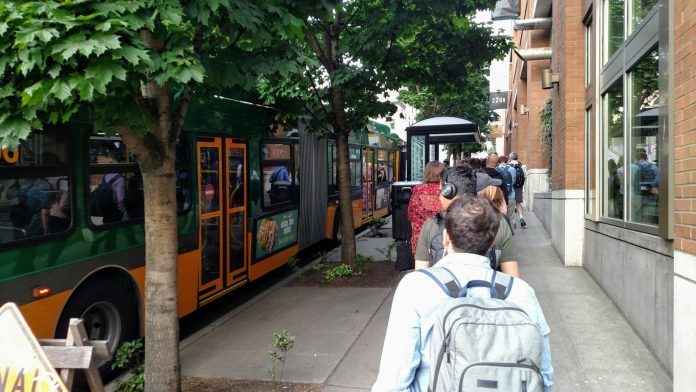Fare enforcement reform has been on the barometer for awhile now in the Puget Sound. Increasingly, it has become apparent that fare enforcement policies in place may be doing more harm than good. An April report by the King County Auditor’s Office shed some light on the issue, calling into question the efficacy of fare enforcement as a concept and providing evidence that King County Metro’s fare enforcement often hit those experiencing homelessness or housing instability the hardest, not run-of-the-mill scofflaws.
King County promptly suspended the practice of sending misdemeanor cases to the sheriff’s office, implemented a new practice of giving youth an extra verbal warning before issuing a citation, and increased training and management of fare enforcement officers following the report. Last week, King County Executive Dow Constantine transmitted legislation to the King County Council that would go much further by establishing new protocols to lessen systematic criminalization and financial hardship that fare enforcement policies can have on low-income individuals and people experiencing homelessness or housing instability.
“Fares are an essential part of funding our regional transit system, but we know some riders have trouble paying,” said Executive Constantine. “We’ve created reduced and even free transit fare programs, but some people still skip the formalities and end up accruing infractions, which can lead to legal headaches that impact housing and employment. We want to find a better way that funds vital public transit service while best supporting our most vulnerable riders.”
Right now, fare enforcement exclusively applies to Metro’s RapidRide brand since those buses operate on a proof-of-payment basis. Transit riders can board at all doors because of off-board fare payment kiosks available at most stops instead of being forced to solely pay onboard upon entry. Metro is briskly expanding the RapidRide network and will soon introduce off-board fare payment on Third Avenue for all buses operating on the corridor regardless of brand, meaning that proof-of-payment–and the fare enforcement that goes hand-in-hand with it–will be greatly expanded. In that context, the impetus to reform fare enforcement policies to become more equitable is vital.
In April, the report from the King County Auditor’s Office highlighted several ways that Metro’s fare enforcement policies could be creating inequitable outcomes, particularly by needlessly putting people through the criminal justice system. According to the report, almost 25% of all fare evasion citations issued and 30% of misdemeanors handed down from 2015 to 2017 ended up going to people experiencing homelessness or housing instability. $290,000 in fines were issued to people experiencing housing instability, creating additional hardship for these people and often going unpaid and racking up late penalties. And a total of 99 people received 10 or more fare evasion violations each, accounting for about 6% of the total fare enforcement penalties issued at that time.
The report also raised eyebrows on clear problems with fare enforcement. ORCA fare card readers often do not work properly, which can leave riders not paying fare. The methodology by which fare evasion is estimated appears to have flawed assumptions. And the King County Auditor’s Office went as far to question the entire theory of fare enforcement. “Although a link between evasion and fare enforcement is often assumed, the relationship is actually not clear,” the office wrote. “Bus and rail systems that allow off-board fare payment generally have some type of fare enforcement. However, research has not found a correlation between fare enforcement and fare evasion: systems that have a lot of fare enforcement report fare evasion rates that are similar to those that have more limited coverage.”
The current fare enforcement protocol generally has three steps: the first offense is a verbal warning, the second offense is a civil infraction citation with a $124 fine, and the third offense is a misdemeanor citation referral to the King County Sheriff.
Under the proposed legislation, Metro would be delegated authority to implement alternative protocols for resolving fare evasion cases. Second-time offenses would be less costly or could be eliminated:
- Fines could be substantially reduced to $50 and even further reduced by half if they are paid with 30 days of citation.
- Alternatively, fines could be avoided if the cited rider agrees to do community service for a local nonprofit organization or enrolls in the ORCA LIFT program. The latter option would only be available to riders who qualify for ORCA LIFT, which offers reduced fares to low-income individuals.
However, if a rider does not fully resolve a second offense within 90 and is then ticketed again, Metro would then be authorized to suspend the rider for a full 30 days.
Portland’s regional transit provider, TriMet, recently implemented a similar approach in July that gives those cited for fare evasion three choices to remedy the issue within 90 days: pay the fine, do community service, or enroll in a low-income/Honored Citizen program. Fines range from $75 to $175, depending upon the number of fare evasion violations that a person has received during the 90-day period, with four or more violations garnering the maximum fine. Likewise, the amount of community service hours required to eliminate fines during the same period ranges from 4 to 15 hours. Registering in the low-income/Honored Citizen fare program during the full 90-days and keeping a minimum of $10 on the Hop FastPass (similar to the ORCA fare card) will also resolve fare evasion violations.
At the announcement of King County’s proposal, several social welfare and transit advocacy groups praised the legislation as a good starting point for reform and a fairer system.
“For so many transit riders, public transit is not an option, it’s a lifeline,” said Katie Wilson, general secretary of the Transit Riders Union. “Not being able to pay a fare should never be an entry point to the criminal justice system, or lead to calls from a debt collector for a ticket you can’t afford to pay. We can do so much better, and this legislation opens the door for that work to happen.”
Jessica Ramirez, a lead organizer for Puget Sound Sage highlighted the threat of the status quo: “As we witness the expansion of RapidRide lines all over the county and now in southeast Seattle, we are concerned with what this will mean for poor and low income people,” she said. “We know the report from the King County Auditor’s office shows that 25 to 30 percent of riders who received citations are/were experiencing housing instability. The 2018 King County homeless count showed an overwhelming percentage that 61 percent are people of color including 27 percent who are Black. We must reimagine a public transit system that decriminalizes the rider because of implicit bias, fare affordability, etc.”
In developing the proposal, King County collaborated with a wide range of stakeholders, including social welfare advocacy groups and fare enforcement officers. The work plan to reform fare enforcement policies will continue beyond legislation sent to Metropolitan King County Council–which should be considered this fall–with the next phase including rider surveys. Metro hopes to get a better understanding of why riders without valid fare fail to pay the proper fare (e.g., financial challenges in paying for fares).
Stephen is a professional urban planner in Puget Sound with a passion for sustainable, livable, and diverse cities. He is especially interested in how policies, regulations, and programs can promote positive outcomes for communities. With stints in great cities like Bellingham and Cork, Stephen currently lives in Seattle. He primarily covers land use and transportation issues and has been with The Urbanist since 2014.




